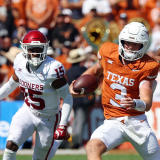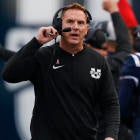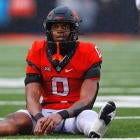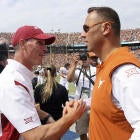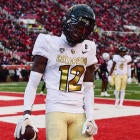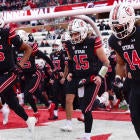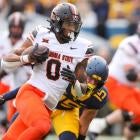In this age of legal sports gambling, college athletics' power brokers have been speaking in code.
"My greatest concerns really start with the integrity of our games." -- Ross Bjork, Ole Miss athletic director
"We need to continue to educate [players] about the challenges associated with gambling and the importance of the integrity of the game." -- Jim Delany, Big Ten commissioner
"For us, the integrity of our games is of the utmost importance." -- Greg Sankey, SEC commissioner
"I think the ultimate question with us is how do you protect the players and the integrity of the game?" -- John Swofford, ACC commissioner
Notice a trend? During their remarks to the media in the just-completed round of preseason media days, each Power Five commissioner mentioned the word "integrity" at least once in regards to gambling.
The word has become a repository for the unknown or a shortcut to the inevitable. Just don't ask those worried about integrity to define it.
"It means that there is [the hope that] no cheating going on," Pac-12 commissioner Larry Scott said, "taking advantage of information illicitly or illegally sharing confidential information with others."
But to think any or all of that won't be continuing in this new era is ignoring the lure of sports gambling whether it be legal or illegal.
Then there is this conundrum: With regulated, single-game sports gambling able to be legalized in any state that wants it, how are officials suddenly worried about less integrity?
There are corporate gambling giants running sports books in Nevada and overseas whose very existence depend on games being square.
"I honestly think, with the commissioners, it's ignorance more than anything else," said Todd Fuhrman, gaming analyst for SportsLine, a CBS Sports brand. "When they talk about this integrity [subject], what -- in my opinion -- they're doing is trying to buy themselves time and figure out how to monetize sports betting."
That may be, but for now, the operative word is actually "fear."
"Integrity" is the code for the worst-case scenario in any sports gambling landscape -- that the games themselves can be rigged.
"As soon as you feel something is predetermined, everything drops off and we're talking about a WWE type of environment," Fuhrman said.
In May, the U.S. Supreme Court allowed states to make their own decisions on sports gambling. A handful of states have done so already. There are estimates that as many as 30 states will adopt legal sports gambling within five years.
But with sports betting now increasingly above board, here's the question that power brokers are so concerned about answering: Is it more likely -- or less likely -- that games will be fixed in this new legal sports betting era?
In other words, how much should college administrators care about integrity?
Former New York mobster Michael Franzese, says he can tell if a game is fixed (usually by manipulating the spread) just by watching it. He wouldn't hazard a guess as to the number of college football games being manipulated. But, rest assured, they are some.
"I'm a great believer in this," said Franzese, a former member of the Colombo crime family who has admitted to fixing games. "The more access you have, the more people gamble. That's true. The more chance you have for things to go awry. It's very simple.
"It happened on the street. The more bookmakers we had on the street, the more [bettors] would get in trouble, the more time you would try to recoup your losses. The same is going to happen now. I don't see that trend stopping. I see it continuing."
Historically, there has been at least one college game-fixing/point-shaving scandal per decade since the 1940s. In recent times, only one of those -- Toledo in 2009 -- has involved college football.
"I'm sure there's plenty of point-shaving scandals, especially on a smaller scale -- especially in college basketball -- that people have never gotten wind of," Fuhrman said.
But Fuhrman doesn't necessarily sense the sky is falling.
"Legalization is somehow going to make match-fixing rampant," he said rhetorically, "and we're going to have an epidemic of epic proportions given we can't protect these college kids. If someone is going to fix a game, they're not going to do it through legal channels."
That's what frightens the college types. The commissioners are worried not only about players but trainers, managers and student assistants -- all of whom could have inside information.
The NFL is essentially a closed loop. Franchises are a business whose employees are more or less in one building. Plus, the main influencers -- the players -- make so much money that shaving points would be of little interest.
In college, injuries, strategy and such esoteric information like team morale can be passed in a campus bar by a student assistant.
Gambling in general is a losing proposition for the consumer. If it was not, Las Vegas wouldn't exist. On the street, if a gambler gets "upside down" (owing money to his bookie), game-fixing can be a quick route to getting even.
"It wasn't really difficult," Franzese said. "With football, it's got to be somebody significant. It's got to be a running back, it's got to be a linebacker, it's got to be a quarterback."
According to a 2012 NCAA study, 26 percent of male athletes gamble on sports. That was more than a 4 percent increase from a 2004 study. In that same study, 68 percent of those who wagered thought sports gambling was a "harmless pastime."
Curiously, male golfers are three times more likely to gamble because of a culture "where on-course wagering is considered a normative aspect of the experience," according to the NCAA.
On its website, the NCAA posts: "The NCAA opposes all forms of legal and illegal sports wagering, which has the potential to undermine the integrity of sports contests and jeopardizes the welfare of student-athletes and the intercollegiate athletics community."
But that's a long, long way from fixing a college football game. It's safe to say that administrators are equally a long way from preventing such misdeeds.
"I'll make a bet with anybody in the room," Tom McMillen told a roomful of college administrators in June. "There will be a 100 percent probability there will be a point-shaving scandal in the future."
McMillen is CEO of Lead1 Association, an organization representing athletic directors in the 10 FBS conferences. He is a former college and professional basketball player who served on the U.S. House of Representatives from 1987-93.
"Personally, I've been opposed to sports betting. I voted against it in Congress. Our ADs are against it," McMillen added. "Yet, we are losing the war at the state level to the gaming interests."
Once legalized sports gambling was allowed to be legislated, the Big Ten swiftly advocated for a national injury report. Such information addresses the need to have as much information as possible above board in the new legal gambling era.
But a national injury reporting method faces significant privacy hurdles. Theoretically, college athletes would have to surrender the right to their private medical information.
Ohio State athletic director Gene Smith has called legalized sports betting "the boogeyman" for college administrators.
"We tend to process things to death," said Smith, who has spoken extensively for the need of a national injury report. "There are best practices that we can implement now. I think we have time. We ought to get that done."
Some schools, conferences and professional leagues have advocated for so-called "integrity fees," a cut of the gambling "handle" to fund more compliance positions.
That's where Fuhrman says colleges want to "monetize" legalized sports gambling.
In the college space, only West Virginia and Marshall have successfully lobbied for integrity fees in their states. A fraction of the gambling handle in West Virginia will be used by those schools to beef up their respective compliance staffs.
"There is no win here for college sports," McMillen said. "You're going to take all the risk. What concerns me is we are not having a concerted effort to get the resources to protect ourselves. … I'm deeply concerned about it because I believe it could blow up college sports."
How will all of it impact how we consume games going forward? Fox analyst Joel Klatt said there was a discussion in his profession whether point spreads would impact how he calls a game.
"I make an analogy to a huge fight," Klatt said. Everyone knows there are millions of dollars being bet. Yet, when you watch the fight, the odds aren't part of the broadcast."
Sankey has similar concerns as his peers. What about the kid who misses a field goal that doesn't cover the spread? What about the tailback who fumbles going into the end zone? The scrutiny on players from a sometimes merciless betting public, he suggested, will be ramped up.
The SEC took the step of bringing in an FBI agent to speak to its game officials.
But at the end of the day, Sankey suggested legalized sports gambling could be a net win.
"As near as I can tell, the real losers in the whole thing are organized crime," Sankey said. "If it's legal everywhere, it's hard to imagine why people would place illegal bets and risk that sort of jeopardy."
NCAA penalties for gambling can result in the loss of eligibility. However, in an interview with CBS Sports earlier this summer, former NCAA vice president Oliver Luck suggested that the NCAA may want to rethink that stance.
"A full season of eligibility? That's a lot [as a penalty], right? For placing a $5 or $10 bet?" he said. "I'm not saying that's right or wrong. The membership, at some point, is going to want us to look at the severity of that, create some sort of sliding scale or whatever."
One network employee has a big problem with the whole "integrity" discussion.
"I get really frustrated when [conferences] sit there on their high horse and talk about integrity," said the network official who did not want to be identified, "… when we have restricted name, [image] and likeness [for athletes], when we restrict transfers. Seven Power Five coaches [who got fired] get bought out for $60 million. Gimme a break.
"Think about the villains that we've made these kids out to be that accepted small payments that were much smaller than what their own market value was. And we want to talk about integrity?"
Bjork has an intense interest. His state already has sports books up and running.
"It's a great concern because it's unknown," he said. "Frankly, we're sitting up here talking about something that we really don't know what the impact is yet."
The NCAA used to have an agent, gambling and amateurism division. That agency no longer exists. The last director of that division, Rachel Newman Baker, has been working in compliance at Kentucky since 2013.
The NCAA did recently announce an internal working group to study the impact of sports wagering. To date, it has not released the names of any of the members.
Almost as soon as the U.S. Supreme Court announced its decision, the NCAA said it would begin allowing championship events to be held in states that allow sports wagering.
Given that move, Nevada -- previously among a handful of states with legal sports betting -- is ramping up an effort to attract as many NCAA events as possible.
"The implications are significant," said Geoff Freeman, executive director of the American Gaming Association. "Colleges now have a choice. The NCAA has a choice. Keep your head in the sand or come into the modern age."
Fuhrman offered one image of that modern age.
"I don't think there is going to be an epidemic [of wrong-doing]," he said. "If anything, things are going to be rooted out a lot faster."
For now, the default setting for college types has been to look to Congress and/or the NCAA for oversight. Either could act as a national regulatory body for legalized sports wagering.
The odds?
"I can't really handicap it," Scott said. "Sorry for the poor choice of words."


